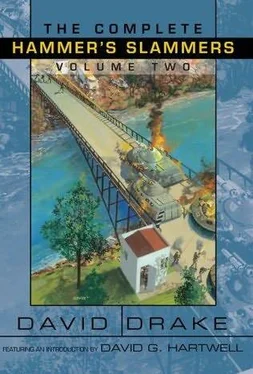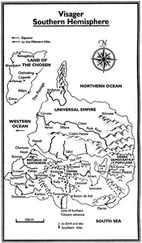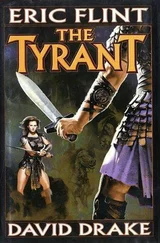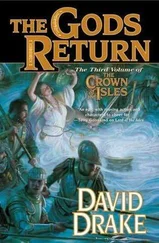David Drake
The Complete Hammer's Slammers Vol. 2 2006
IN DEFENSE OF DAVID DRAKE'S HAMMER'S SLAMMERS STORIES:
An Introduction by David G. Hartwell
Any fiction that portrays war in SF, since the 1960s, has generally been eliminated from the leading ranks unless it is entirely dedicated to the proposition that war is, in Isaac Asimov's phrase, the last refuge of the incompetent. All military SF became suspect in the 1970s, and most of it was rejected by major portions of the serious readers of literate SF, as advocating war. This was evident at Robert
A. Heinlein's famous guest of honor speech at MidAmericon in Kansas City in 1976,at which he was publicly booed for stating that war was a constant in world history, and that there was every indication that there would continue to be war in the future. At least since that time, much of the literary SF community has unfortunately failed to distinguish portrayal of war from advocacy of war, or to be interested in examining military SF. The literary community even tends to avoid the authors at convention parties. The only leading writer to overcome this has been Joe Haldeman, author of The Forever War , and a majority of his fiction since has not been military SF. And so those authors hang out with their own crew, usually the Baen crew, mostly at conventions in the midwestern and southeastern US, where they are not so easily marginalized.
David Drake was a well-known young horror writer and fan, who published both fantasy and SF in the magazines in the mid-1970s. I knew David fairly well then. He was a young attorney who had served in Vietnam. He was most prominent in horror circles. He was on the editorial board of Stuart David Schiff's distinguished small press horror magazine, Whispers, and co-proprietor, with Karl Edward Wagner and Jim Groce, of Carcosa, a leading small press founded to publish the works of Manly Wade Wellman, who was a mentor to both Wagner and Drake. He was on the first Young Writers panel at the first World Fantasy Convention in 1975. He got a great literary agent, Kirby McCauley, who gathered all the best in the horror field in the 1970s under his aegis. And he soon had a contract to write his first novel, The Dragon Lord , a gritty, realistic Arthurian fantasy.
Jim Baen was editing Galaxy in those days, struggling heroically to keep it alive, and one of the writers whose SF he was publishing was David Drake. But no matter how nobly Baen strove to keep it alive—and he was widely admired throughout the SF community for his efforts—the magazine was failing and, just before it died, Baen moved to Ace Books, under publisher Tom Doherty. Baen was and is a smart editor, and was used to making bricks without straw, and silk purses out of a variety of materials on a low budget.
I was the SF editor for Berkley Books and bought the Drake novel. But my superiors at Berkley couldn't imagine doing a short story collection by a not-yet-published first novelist, so I was not allowed to offer to buy Drake's Hammer's Slammers . Jim Baen bought it immediately, and published it quickly and successfully. The rest, as they say, is history. The Hammer's Slammers stories became Drake's trademark, for better or worse. And when Jim Baen moved to Tor and then founded Baen Books, David Drake became one of his trademark writers, so much so that in 1984 when Bruce Sterling, in the course of founding the cyberpunk movement in his fanzine Cheap Truth , attacked Baen Books, he named David Drake, Jerry Pournelle, and Vernor Vinge as symbols of Baen, and of the military/militarist right wing. At that point Drake's fiction fell out of the serious discourse in the SF and fantasy field, with very little questioning of the accuracy or merits of Sterling's attacks, or the virtues of Drake's writing. It was military and that was enough.
A loyal friend,Drake has remained a mainstay of Baen Books to this day,and stayed with Kirby McCauley, his agent through thick and thin. I am fortunate to be the editor of his fantasy series, Lord of the Isles , and doubly so because since I have a doctorate in medieval literature, and since David reads classical Latin writers for pleasure, I can enjoy many of the references and allusions to classical sources. Not all, I hasten to add, but it keeps me on my toes and I like that.
But this is an introduction to a volume of Hammer's Slammers stories, and so I'd like to mention a few things that might not be immediately obvious. Certainly Drake uses both his detailed knowledge of military history and his own experiences and observation from his service in Vietnam to construct what is probably the most authentic military SF fiction of this era. But it appears to me that he is often doing a great deal more and that his fiction can yield up some surprising additional benefits.
For instance,his early story,"Ranks of Bronze,"and the later novel of that title, adapts a real historical event(a lost legion of Roman soldiers,Crassus' mercenaries—see Drake's afterword to the novel) and translates it into SF. A Roman legion is snatched from Earth into space to be used as mercenaries owned and operated by superior aliens out for profit, to fight relatively low-cost, low-technology wars on alien planets against alien races, with whom they have no personal quarrel, and perhaps only dimly comprehend. No one in the legion has any choice in this. The soldiers behave in a convincingly plausible way, the way Roman soldiers would. They are a very effective fighting force and can most often win. They are moved without notice from one planet to another, fight (sometimes die). They are wretched.
This is military SF with the contemporary politics stripped off, and removed from the level of policy decisions. The soldiers go to a place. They are told who to fight. They win or die. They go to the next place. This is, it seems to me, the true experience of the ordinary fighting man or woman in a military organization throughout history, who has very limited choice. Various individuals manifest good or bad behavior, sanity or craziness, cleverness or stupidity. And luck matters. No one has the big picture, which may be known when the fighting is over and may not. The ones who do the job best tend to survive and perhaps rise in the ranks. Some of them are bad and or crazy, but not stupid, which leads to death. There is very little moral choice possible, but the characters we tend to admire are those who are sane, careful, and make moral choices as they can.And try to live with them afterward. There is no access to those who make policy in Drake's military fiction. All in all it is a fairly dark vision of human life.
By using SF as a distancing device, and by further using classical mercenaries as soldier characters, Drake constructs a fictional space in which he can investigate and portray certain kinds of human behavior, heroism, loyalty, cowardice, the strategic working out of detailed military actions and the impact on them of individuals behaving well or not, of high and low technology for killing functioning properly or not.And he can do this with something analogous to clinical detachment as the killing commences, without advocating policy.
No one who reads Drake properly can imagine him advocating war.War exists and Drake chooses or is compelled to portray it as it is, and has been, and might be close up. This military SF is not military pornography but rather a form of horror fiction (see "The Interrogation Team," for instance). It is not intended to deaden the sensibilities to the horrors of war, but to awaken them. Like Ambrose Bierce's "Chickamauga." Like Stephen Crane's "The Red Badge of Courage." Or sometimes like Tolstoy's descriptions of the advance of Napoleon's armies on Moscow in War and Peace . Historical parallels abound in Drake's stories, but distanced into space and the future. This is the same David Drake as the horror writer, not a different person.
Читать дальше












